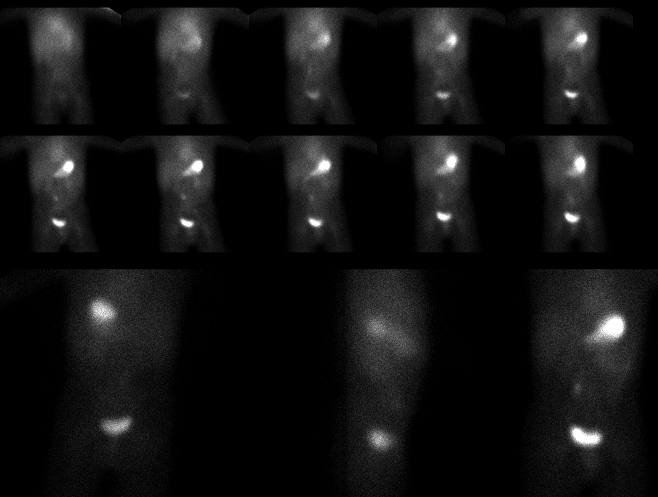Case Author(s): Brigid Gordon,MD and Jerold Wallis, MD , 2/28/97 . Rating: #D2, #Q3
Diagnosis: Meckel's diverticulum.
Brief history:
2 1/2 year old male with a one day history of bloody stool.
Images:

Sequential 3-minute images of the anterior abdomen (above and middle); the bottom
row shows posterior, right lateral, and anterior images of the
abdomen at 30-40 minutes post injection of tracer.
View main image(ms) in a separate image viewer
Full history/Diagnosis is available below
Diagnosis: Meckel's diverticulum.
Full history:
2 1/2 year old male with a one day history of bloody stools. An air
contrast enema was performed immediately prior to this scintogram
that demonstrated no evidence of intussusception.
Radiopharmaceutical:
2.2mCi Tc99m-pertechnetate i.v.
Findings:
Abnormal focus of activity that appeared at the same time with
the inital uptake in the stomach and persisted in the right lower quadrant suspicious
for a meckel's diverticulum. The focus is more clearly seen on the
anterior image than the posterior image, suggesting an anterior location.
Discussion:
Meckel's diverticulum is the most common cause of lower gastrointestinal
hemorrhage in previously healthy infants. More than 50% of infants with
the remnant have symptoms before the second year of life. Clinical
symptoms occur in 25-30% of all patients. Estimates of the probable incidence
of Meckel's diverticulum range from approximately 1-3%, with a frequency
three times greater in males than females. The most common presenting
symptom is gross rectal bleeding. The bleeding apparently results from
mucosal ulceration in the diverticulum or the adjacent ileum causes by the
hydrochloric acid secreted by the ectopic gastric mucosa. Nearly all
diverticula in patients with symptoms contain ectopic gastric mucosa.
Reference: Pediatric Nuclear Medicine. Treves, S., Springer-Verlag,
New York, 1995.
Followup:
Patient underwent successful surgical removal of a small section of
ulcerated bowel adjacent to the diverticulum and the diverticulum itself.
He made an uneventful recovery.
Major teaching point(s):
Gastrointestinal bleeding in children may be caused by a Meckel's
diverticulum.
The tracer accumulation demonstrates the same time course as that of
the gastric mucosa in the stomach.
Posterior images are useful to help exclude accumulation in a renal
pelvis, which can sometimes mimic a Meckel's diverticulum.
Differential Diagnosis List
Active gasterointestinal bleeding from a non-Meckel's source at the
time of injection can
occasionally give a similar scintigraphic appearance
ACR Codes and Keywords:
References and General Discussion of Meckel's Scintigraphy (Anatomic field:Gasterointestinal System, Category:Inflammation,Infection)
Search for similar cases.
Edit this case
Add comments about this case
Return to the Teaching File home page.
Case number: ms003
Copyright by Wash U MO

